“Being present is at the heart of yoga. Focusing on your physical sensations, breathing, and mental processes can help you relax and feel more at ease.” – Wellness Kraft
Introduction
Yoga is a practice that has been around for over 5000 years, but it has only recently gained popularity in the Western world. As more and more people look for ways to reduce stress, improve their physical health, and find inner peace, it has become a go-to exercise for many. In this article, we will explore the surprising benefits of yoga for both the mind and body.
From increased flexibility to better sleep, and from stress reduction to pain management, we will examine the ways in which yoga can transform your life. Whether you are a beginner or an experienced yogi, there is something here for everyone.
Table of Contents
Meaning
Yoga is a practice that originated in ancient India and is now practiced all over the world. It is a physical, mental, and spiritual discipline that involves a series of poses, breathing exercises, and meditation. The word “yoga” comes from the Sanskrit word “yuj,” which means to yoke or unite, and it is often described as a means of uniting the mind, body, and spirit.
The physical aspect involves a series of poses or asanas that are designed to improve strength, flexibility, and balance. These poses range from simple stretches to more complex movements, and they can be modified to suit the needs of each individual practitioner.
In addition to the physical benefits, it is also known for its mental and emotional benefits. Through breathing exercises and meditation, practitioners can learn to calm the mind, reduce stress and anxiety, and improve overall well-being.
It is often practiced in a group setting, but it can also be practiced individually at home or in nature. It is a versatile practice that can be adapted to suit the needs of people of all ages and fitness levels.
Physical Benefits
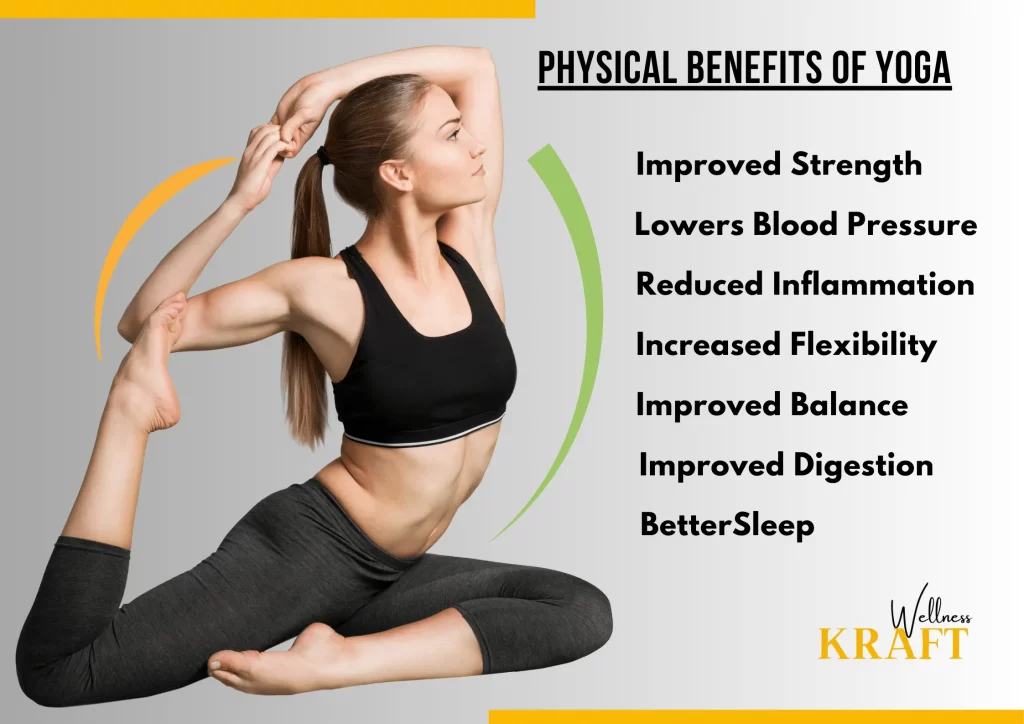
Increased flexibility:
One of the most well-known physical benefits is improved flexibility. Through regular practice, it can help increase range of motion in the joints and muscles, which can lead to better posture and reduced risk of injury.
Improved strength:
It also helps to build strength in the muscles, especially in the core, arms, and legs. This can help improve overall physical fitness and make daily tasks easier to perform.
Improved balance:
Since many yoga positions call for balance, doing so can increase stability and lower the chance of falling. This is especially important for older adults, who may be at a higher risk of falls and related injuries.
Reduced inflammation:
Studies have shown that practicing yoga regularly can help reduce inflammation in the body. This can help reduce the risk of chronic diseases such as heart disease, diabetes, and cancer.
Lowers blood pressure:
Yoga has been shown to help lower blood pressure in people with hypertension. This is likely due to the relaxation and stress-reducing effects of the practice.
Improved digestion:
Certain yoga poses can help stimulate digestion and relieve digestive issues such as constipation and bloating.
Better sleep:
It has been shown to help improve sleep quality and reduce insomnia. This is likely due to the relaxation and stress-reducing effects of the practice.
Mental Benefits
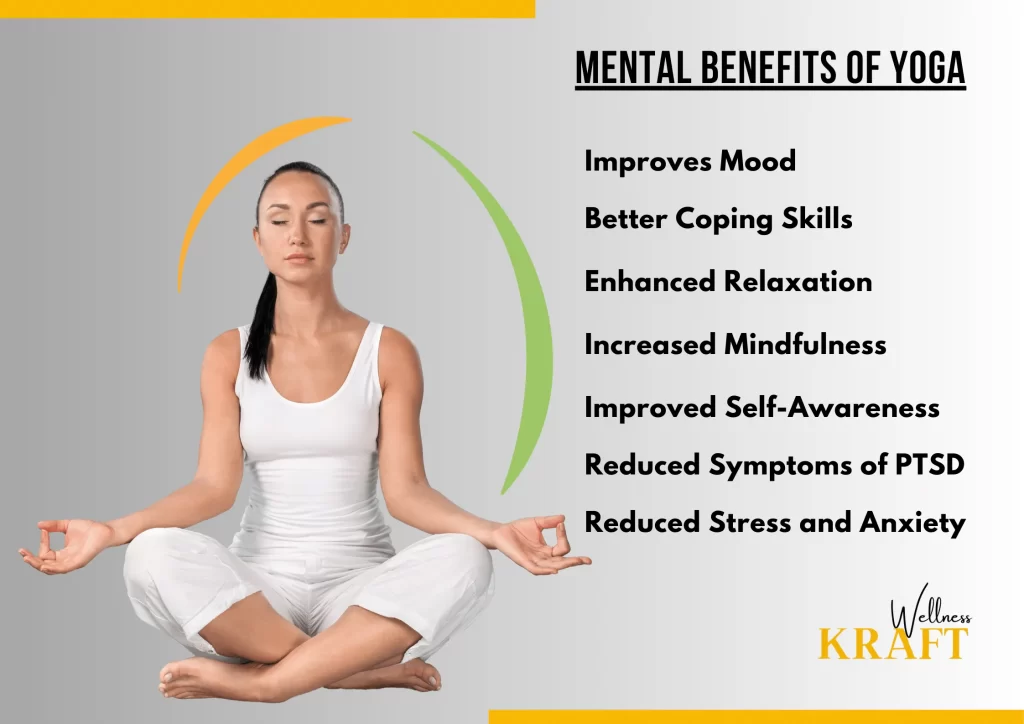
Reduced stress and anxiety:
One of the most well-known mental benefits is its ability to reduce stress and anxiety. Through breathing exercises and meditation, yoga can help calm the mind and reduce the physiological symptoms of stress.
Improves mood:
Regular yoga practice has been shown to help improve mood and reduce symptoms of depression. This may be due to the release of endorphins, which are natural feel-good chemicals in the body.
Increased mindfulness:
Yoga can help cultivate mindfulness, which is the practice of being fully present in the moment. This can lead to improved concentration, focus, and awareness.
Better coping skills:
Through regular practice, it can help develop better coping skills for dealing with difficult emotions and situations. This can lead to improved resilience and overall emotional well-being.
Reduced symptoms of PTSD:
Yoga has been shown to be an effective complementary treatment for post-traumatic stress disorder (PTSD). It can help reduce symptoms such as anxiety, depression, and hypervigilance.
Improved self-awareness:
Through regular practice, individuals can become more aware of their thoughts, feelings, and physical sensations. This can lead to improved self-awareness and self-reflection, which can help improve overall well-being.
Enhanced relaxation:
It can help promote deep relaxation, which can help reduce tension in the body and improve overall physical and mental relaxation.
Spiritual Benefits

Connects You with Your Inner Self:
Yoga is a practice that emphasizes the connection between the mind, body, and spirit. By practicing, you can connect with your inner self and gain a deeper understanding of who you are. It can help you develop a sense of self-awareness and self-acceptance, which can lead to a greater sense of peace and contentment.
Cultivates Mindfulness:
It is a mindful practice that encourages you to focus on the present moment and be fully present in your body. Through regular practice, you can cultivate mindfulness and learn to let go of distractions and negative thoughts. This can help you become more resilient to stress and anxiety and improve your overall well-being.
Enhances Spiritual Growth:
Yoga is a spiritual practice that can help you connect with a higher power or divine energy. By practicing, you can tap into your spiritual side and enhance your spiritual growth. It can help you develop a greater sense of purpose and meaning in life, which can lead to a more fulfilling and satisfying existence.
Boosts Inner Strength:
Yoga can help you develop inner strength and resilience by challenging you to push past your physical and mental limits. Through regular practice, you can build physical strength and endurance, but also mental fortitude and emotional resilience. This can help you face life’s challenges with greater ease and grace.
Provides a Sense of Community:
It is a practice that can be done alone or in a group setting. By practicing with others, you can create a sense of community and connection. Yoga classes often foster a supportive and encouraging environment that can help you feel more connected to others and less isolated.
Promotes Compassion and Kindness:
Yoga encourages you to cultivate compassion and kindness towards yourself and others. By practicing, you can develop a greater sense of empathy and understanding, which can help you build stronger relationships and contribute to a more compassionate and kind world.
Encourages Self-Reflection:
Yoga is a practice that encourages self-reflection and introspection. By taking the time to reflect on your thoughts, emotions, and behaviors, you can gain a deeper understanding of yourself and your place in the world. This can lead to greater self-awareness and personal growth.
Fosters Gratitude:
Yoga can help you cultivate a sense of gratitude for the present moment and all that you have in your life. By practicing, you can learn to appreciate the small things in life and find joy in the present moment. This can lead to a greater sense of happiness and contentment.
Supports Emotional Healing:
Yoga can help you heal from emotional wounds and past traumas by providing a safe space for self-expression and self-care. By practicing, you can learn to release negative emotions and thoughts and replace them with positive, healing energy.
Deepens Your Spiritual Connection:
Yoga is a spiritual practice that can help you deepen your connection to a higher power or divine energy. By practicing, you can cultivate a greater sense of inner peace and contentment, which can help you feel more connected to the world around you.
Yoga and Stress Reduction
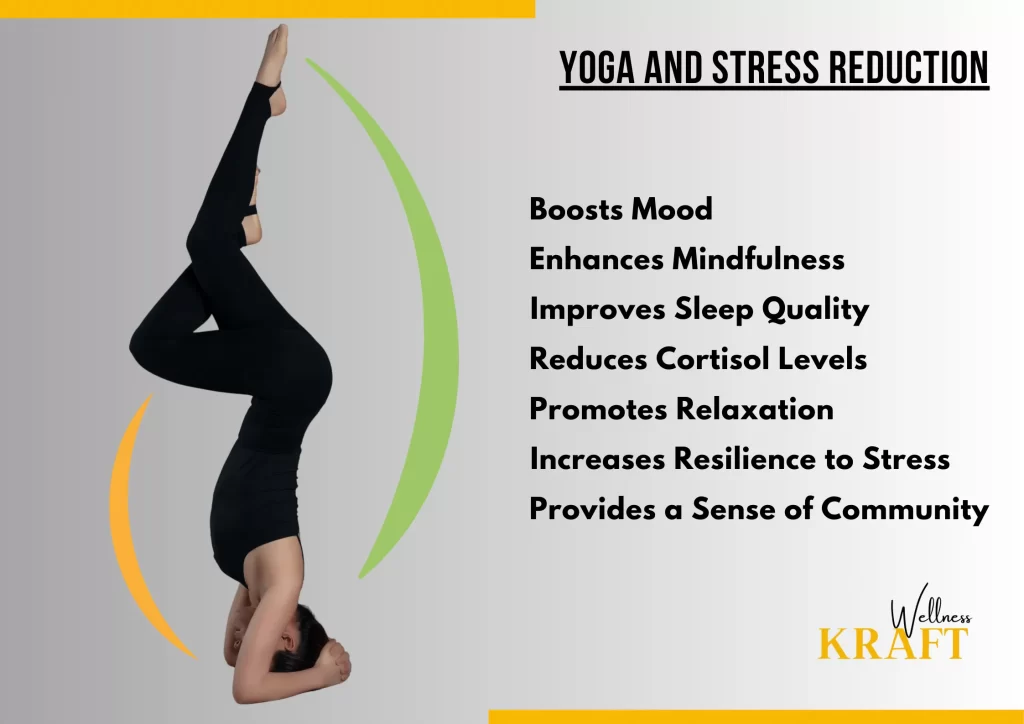
Promotes Relaxation:
Yoga is a practice that emphasizes relaxation and stress reduction. Through the physical postures, breathing exercises, and meditation, it can help calm the mind and reduce tension in the body. This can lead to a greater sense of relaxation and a reduction in stress levels.
Reduces Cortisol Levels:
Cortisol is a hormone that is released by the body in response to stress. High levels of cortisol can lead to a variety of health problems, including weight gain, high blood pressure, and immune system suppression. Studies have shown that yoga can help reduce cortisol levels in the body, which can lead to a reduction in stress and its associated health problems.
Improves Sleep Quality:
Stress can have a significant impact on sleep quality, making it difficult to fall asleep and stay asleep. Yoga can help improve sleep quality by promoting relaxation and reducing stress levels. In addition, the physical postures and breathing exercises can help calm the body and prepare it for a restful night’s sleep.
Enhances Mindfulness:
Mindfulness is a state of mind that involves being fully present in the moment and aware of your thoughts and emotions. Yoga is a practice that emphasizes mindfulness and encourages you to focus on the present moment. Through regular practice, you can develop greater mindfulness and awareness, which can help reduce stress and promote overall well-being.
Boosts Mood:
Stress can have a significant impact on mood, leading to feelings of anxiety, depression, and irritability. Yoga can help boost mood by promoting relaxation and reducing stress levels. In addition, the physical postures and breathing exercises can help release endorphins, which are natural mood-boosting chemicals in the body.
Increases Resilience to Stress:
Yoga can help increase resilience to stress by improving your ability to cope with stressful situations. Through regular practice, you can develop greater physical and mental strength, which can help you handle stress with greater ease and grace.
Provides a Sense of Community:
Yoga classes provide a supportive and encouraging environment that can help reduce stress and promote overall well-being. By practicing, with others, you can create a sense of community and connection, which can help reduce feelings of isolation and loneliness.
Yoga and Improved Sleep
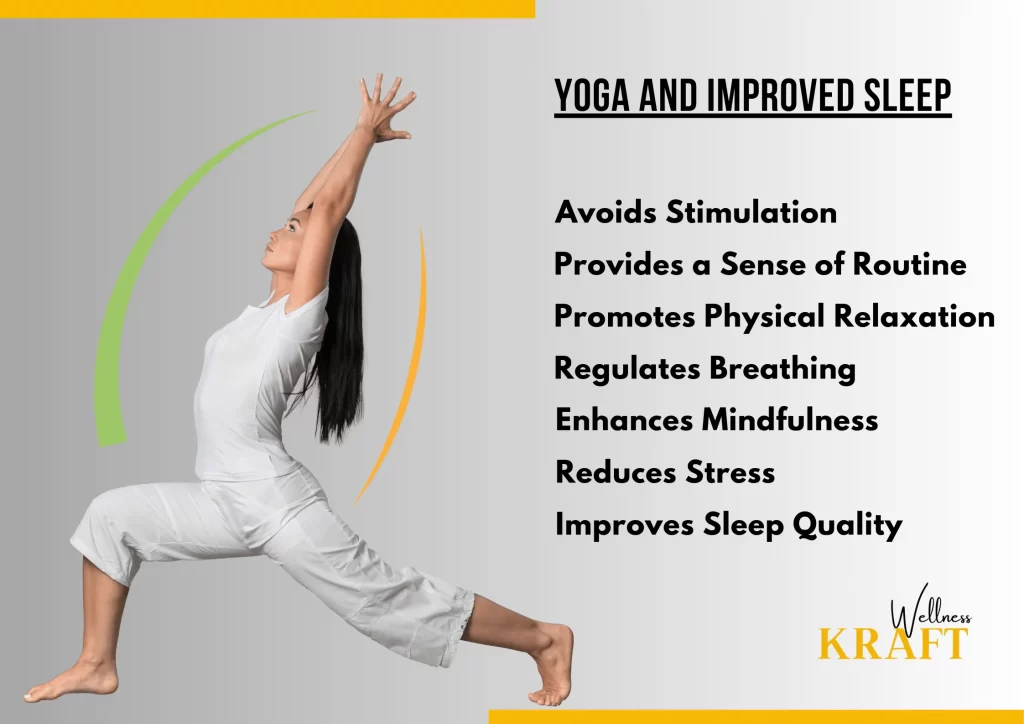
Reduces Stress:
Stress is a major contributor to poor sleep quality. Yoga can help reduce stress levels by promoting relaxation and calming the mind and body. The physical postures, breathing exercises, and meditation can help you unwind and prepare for a restful night’s sleep.
Improves Sleep Quality:
Yoga can help improve sleep quality by promoting relaxation and reducing stress levels. Studies have shown that practicing regularly can improve the quality and duration of sleep. In addition, the physical postures and breathing exercises can help calm the body and prepare it for sleep.
Enhances Mindfulness:
Mindfulness is a state of mind that involves being fully present in the moment and aware of your thoughts and emotions. Yoga is a practice that emphasizes mindfulness and encourages you to focus on the present moment. Through regular practice, you can develop greater mindfulness and awareness, which can help improve sleep quality.
Regulates Breathing:
Breathing exercises, or pranayama, are an important part of yoga practice. These exercises can help regulate breathing, reduce stress, and promote relaxation. By incorporating breathing exercises into your bedtime routine, you can help calm your mind and body and prepare for sleep.
Promotes Physical Relaxation:
Yoga postures, or asanas, can help promote physical relaxation and reduce tension in the body. By practicing gentle yoga poses before bed, you can help release tension and prepare your body for sleep.
Provides a Sense of Routine:
Creating a bedtime routine that includes yoga can provide a sense of structure and routine, which can help promote better sleep. By practicing, at the same time each night, you can help regulate your body’s natural sleep-wake cycle and improve sleep quality.
Avoids Stimulation:
Yoga is a low-impact, gentle form of exercise that can help promote relaxation. Unlike high-intensity workouts, it avoids stimulating the body and can be practiced in the evening without disrupting sleep.
Yoga for Pain Management
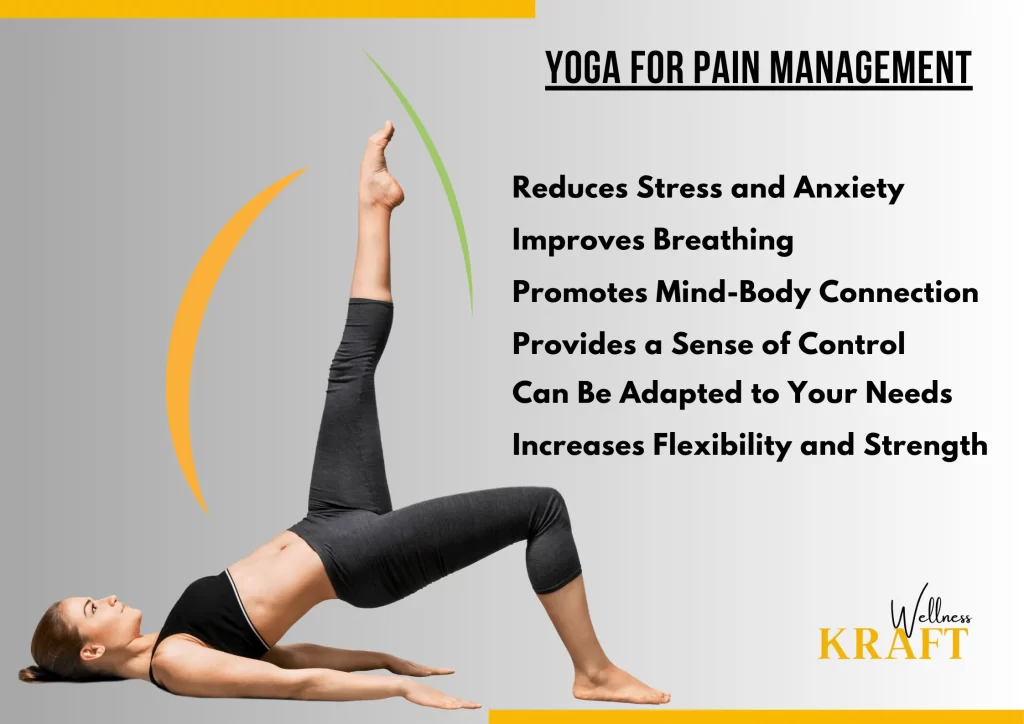
Reduces Stress and Anxiety:
Stress and anxiety can exacerbate chronic pain and make it harder to manage. Yoga can help reduce stress and anxiety levels, which in turn can reduce the perception of pain. By practicing regularly, you can develop greater mindfulness and awareness, which can help you manage your pain more effectively.
Increases Flexibility and Strength:
Yoga postures, or asanas, can help increase flexibility and strength in the body. By improving your physical condition, you may be able to reduce pain and improve mobility. Gentle yoga poses can also help release tension in the body, which can reduce pain and discomfort.
Improves Breathing:
Breathing exercises, or pranayama, are an important part of yoga practice. These exercises can help regulate breathing, reduce stress, and promote relaxation. By incorporating breathing exercises into your pain management routine, you can help calm your mind and body and reduce the perception of pain.
Promotes Mind-Body Connection:
Yoga emphasizes the connection between the mind and body. By practicing regularly, you can develop greater awareness of your body and its sensations. This awareness can help you identify and manage pain more effectively.
Provides a Sense of Control:
Chronic pain can be overwhelming and make you feel like you have no control over your body. Yoga can help provide a sense of control by giving you a tool to manage your pain. By practicing regularly, you may feel more empowered and better able to cope with your pain.
Can Be Adapted to Your Needs:
Yoga can be adapted to your individual needs and abilities. There are many different styles and levels of yoga, and modifications can be made to accommodate physical limitations or injuries. A skilled trainer can help you develop a practice that is safe and effective for managing your pain.
Concluding thoughts
In conclusion, yoga has numerous benefits for both physical and mental health, including stress reduction, improved sleep, and pain management. By practicing regularly, individuals can improve their overall wellness and quality of life. The Wellness Kraft article provides valuable insights into the benefits and how it can be used as a complementary therapy to promote wellness. It is important to note that yoga is not a substitute for medical treatment, and individuals should always consult with their healthcare provider before starting practicing it. With proper guidance and a consistent practice, it can be a powerful tool for promoting wellness and improving overall health.
Key Takeaways
1.Yoga can be used as a complementary therapy to manage stress, anxiety, sleep, and chronic pain.
2.Regular practice can improve physical strength, flexibility, and mobility.
3.Breathing exercises and meditation can help reduce stress and promote relaxation.
4.It emphasizes the connection between the mind and body, helping individuals develop greater awareness and mindfulness.
5.While yoga has many benefits, it is important to consult with a healthcare provider before starting a new practice, particularly if you have a pre-existing medical condition.
6.By incorporating yoga into your wellness routine, you can improve your overall health and wellbeing.
FAQs
1.What advantages does yoga have for mental health?
It can help reduce stress and anxiety, improve mood, promote relaxation, and increase mindfulness and self-awareness.
2.Can yoga help with weight loss?
It can be a helpful part of a weight loss or weight management plan by improving physical fitness, increasing mindfulness around eating, and reducing stress levels.
3.How does yoga improve flexibility?
Yoga postures, or asanas, are designed to stretch and lengthen muscles, which can increase flexibility over time with regular practice.
4.Is yoga a good workout?
It can be a challenging workout, depending on the style and intensity of the practice. It can improve strength, flexibility, balance, and cardiovascular health.
5.Can yoga help with sleep problems?
Yoga can promote relaxation and reduce stress levels, which can improve sleep quality. Certain postures and breathing exercises can also be helpful for improving sleep.
6.Can yoga help with depression?
It can be a helpful complementary therapy for managing symptoms of depression by reducing stress and anxiety levels, promoting relaxation, and increasing self-awareness.
7.How does yoga benefit the heart?
It can help improve cardiovascular health by reducing stress levels, improving circulation, and lowering blood pressure and cholesterol levels.
8.Can yoga help with digestion?
It can promote digestive health by reducing stress levels, improving circulation and lymphatic flow, and promoting relaxation.
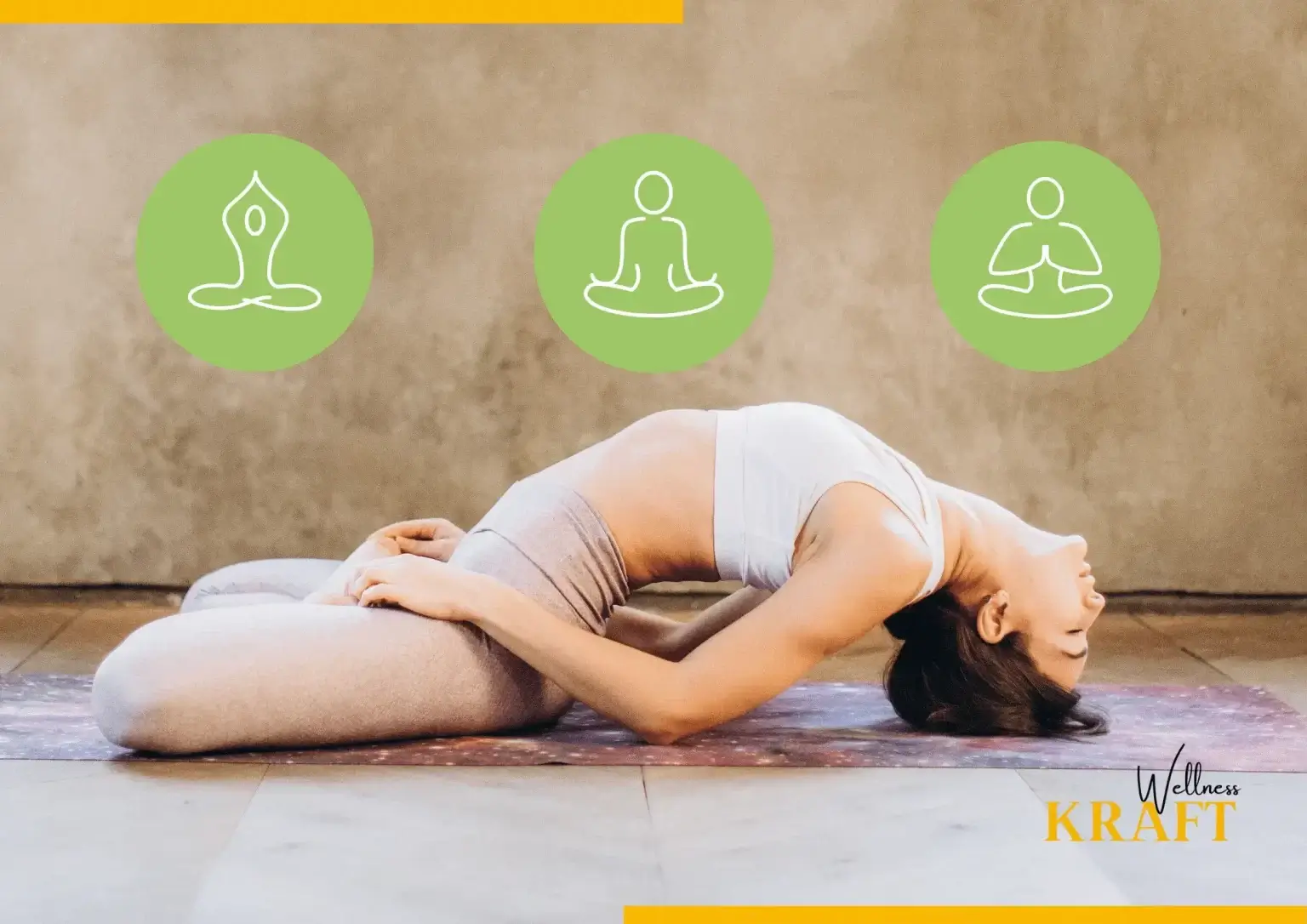







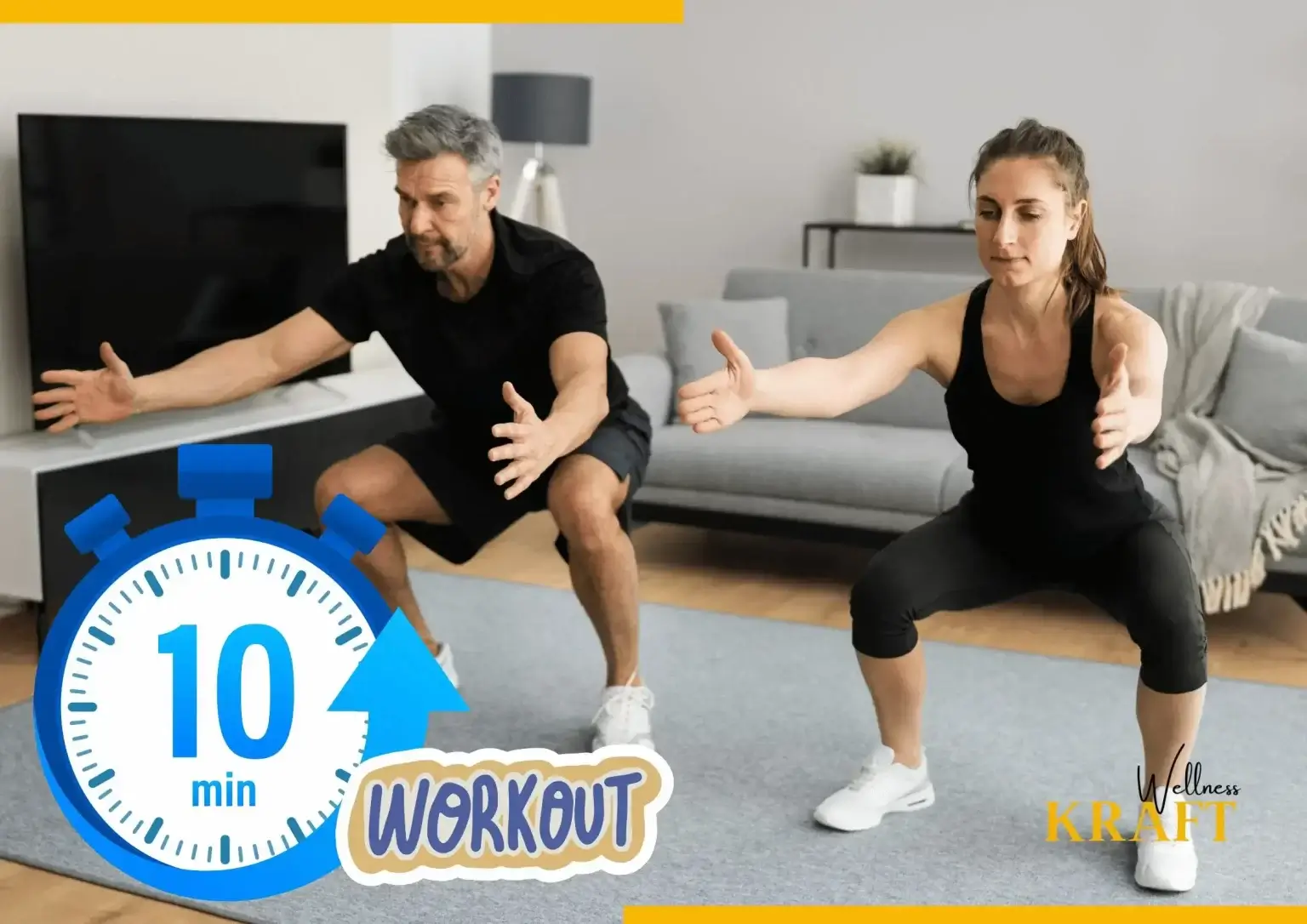


1 comment